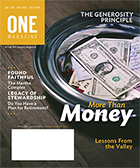
February-
March 2016
More Than Money
------------------
|






Lessons From the Valley
By Candice Smith
When facing tragedy, it is natural to ask why and to look for something of great significance to give meaning to the experience. If you are like me, you want the lesson to be quick and simple like, “Joseph was sold by his brothers into slavery so he could later save his family and preserve the Israelite nation” (see Genesis chapters 37, 39-50).
There are just a couple of problems with that kind of perspective. In the first place, Joseph’s ordeal was neither quick nor simple. It was many years before he found himself in the position to accomplish this great task, and it involved many twists and turns. Furthermore, while the salvation of the Israelites answers the why? in the big picture, God was also working in all the “little pictures” of Joseph’s life and his family. Do we sometimes focus so much on the big miracles that we miss the little ones along the way?
Consider Judah. The brother who suggested selling Joseph into slavery later offered himself as a slave to save another brother. Obviously, he had allowed God to do some character building within him. Each of Joseph’s other family members has a story as well; we just haven’t been given their information. My point is that every individual was affected. More important, though, their response was their own responsibility. I wonder if we have heard the refrain “It’s not all about me” so much that we forget or ignore the fact that some of it is about us. Every event, situation, and experience is an opportunity for growth when we submit to God. There’s the rub—we must submit ourselves.
In the December-January issue of ONE, I shared my experiences with grief: friendships lost; an unhealthy marriage, abandonment, and divorce; the terminal diagnosis and death of a granddaughter; and more. As much as I wanted to understand Why? I realized that a more important question was What?
What does God want me to learn? And in what ways can I glorify Him through this experience? Turns out, a lot. By no means do I claim to have this worked out flawlessly or completely, but here are some lessons I learned in the valley:
I am not perfect. I know. I can practically hear your gasps of disbelief. Seriously, though this is something I have always known, it didn’t prevent me from expecting it of myself. Even in recovery, I felt driven to “do it right.” It took a long time to extend grace to myself, which brings me to another lesson.
God’s grace is greater than I ever comprehended. At the risk of sounding trite, His grace truly is amazing. Through my involvement in a Christ-centered recovery program, I have witnessed and experienced so much of His grace in other believers. I suspect it was there all along if I had been willing and able, in other words, humble enough to see and receive it. “But He gives more grace. Therefore He says: ‘God resists the proud, but gives grace to the humble’” (James 4:6).
We have all heard that when you think you’ve got humility, you’ve lost it. So while I can’t say I’ve attained it, I’ve had plenty of lessons in this area. Pride is at the heart of my perfectionism and the low self-worth that drives it. A low self-image is pride in disguise. Humility is seeing myself as God sees me, His precious creation with whom He desires to have a relationship, but who is helplessly lost and broken without Him.
These lessons in grace and humility have taught me something else—compassion. Anyone remember the spiritual gifts surveys popular in the ’90s? While I scored fairly high in a couple of areas, the gift of mercy barely registered. I recognized its value and made attempts to cultivate it, but suffering is a more effective teacher. A big part of the problem was the wall I built around my heart. Trying to protect myself from continual hurt only made me hard. Public humiliation and a fresh perspective on grace has torn down that wall and softened my heart. Although mercy still isn’t my spiritual gift, I see definite progress.
There is a difference between being strong and being hard. I will be the first to admit I had confused one for the other. More and more, I am learning the truth of 2 Corinthians 12:9: His strength is perfected in my weakness.
Emotional needs are as valid as physical needs. This simple truth may be obvious to most of you, but it was not part of my philosophy. This misbelief hindered my capacity for compassion and is why I needed the wall. Grief deconstructed many of the presuppositions I had in this area, and I have been working to build a balanced, biblical philosophy.
Reality can be an unpleasant place to live sometimes, but living in denial or fantasy brings bondage and pain in the long run. You can’t heal a wound by pretending it isn’t there. “You will know the truth, and the truth shall make you free” (John 8:32).
Before I could forgive, I had to learn what forgiveness is not. It is not being a scapegoat or doormat. It is not pretending you are not being hurt. It is not making excuses for (or ignoring) willful sin. It is not an absence of boundaries. And it is not easy. Frankly, many days I still struggle with this one, but God takes my willingness and makes me able. Recently, He has provided opportunities to see my progress. “Being confident of this very thing, that he who has begun a good work in you will perform it until the day of Jesus Christ” (Philippians 1:6).
Patience…one of the hardest lessons of all. Moving through grief (and working on these life lessons) takes longer than I want and longer than many others think it should, but it cannot be rushed. Closure is a nice concept, but I am not sure it is entirely realistic. Over and over I have been revisited by pain I thought I had put to rest. Each time I dealt with it, I thought, “That was the last time; I’m finally over it!”
Thankfully, as time goes on, the episodes don’t last as long. “But let patience have its perfect work, that you may be perfect and complete, lacking nothing” (James 1:4).
Trying to be what others think I should be is a prison. God is the One who created me, and He is the One who determines my purpose. I have made peace with the fact that not everyone will like me or understand me. That’s not my responsibility. “Am I now trying to win the approval of human beings, or of God? Or am I trying to please people? If I were still trying to please people, I would not be a servant of Christ” (Galatians 1:10).
God can be absolutely, completely trusted. When you sense His presence, and when you feel forsaken. When the blessings are pouring down and when your world is falling to pieces. When you’re feeling strong and victorious, and when you’re curled into a ball praying for the end to come quickly. My grief really tested my faith and exposed areas where it was weak, and ultimately led to the revelation of some deep issues God continues to heal. He proves Himself faithful every time I fail.
Some joys lie only on the path of suffering. When we received the news that my unborn granddaughter was terminal, we were devastated. As the shock wore off and we were forced to live in a state of constant dread, others often suggested the sooner it was over, the better. Some even went so far as to say, “Too bad the doctors didn’t ‘take’ her.” To that I say: we are grateful for every moment we had with her before and after her birth. She was worth every tear. My life is richer, and I am better for having known and loved Elaina. As I look at other painful circumstances, I can identify something to be thankful for in each one.
Please understand that I do not believe or mean to imply that any of these lessons were the reason for my valley experiences. I choose to leave the why question in God’s hands; maybe I will never know. These lessons are simply illustrations of how He works in the darkest of circumstances to bring blessing and good. I have learned things and grown in ways that perhaps were not possible otherwise.
This is my account from my vantage point. Each person involved has his/her own account, and it is different from mine. It is up to each one to ask God, “What do you want to teach me?” Often, we allow fear or pride to resist the deep spiritual work that must take place for us to become Christ-like. Difficult things are inevitable, but the real tragedy is to go through them without growing or learning lessons in the valley.
About the Writer: Candice Smith is a 2014 Welch College graduate. After several months of employment at North American Ministries and International Missions, she returned to New Brunswick, Canada, in the fall of 2015. She currently serves as Treasurer for the Atlantic Canada Association of FWB, co-leads two recovery groups, attends University of Maine in Presque Isle, and is Nana to three awesome superheroes: Parker, Strider, and Callum.
|
|

